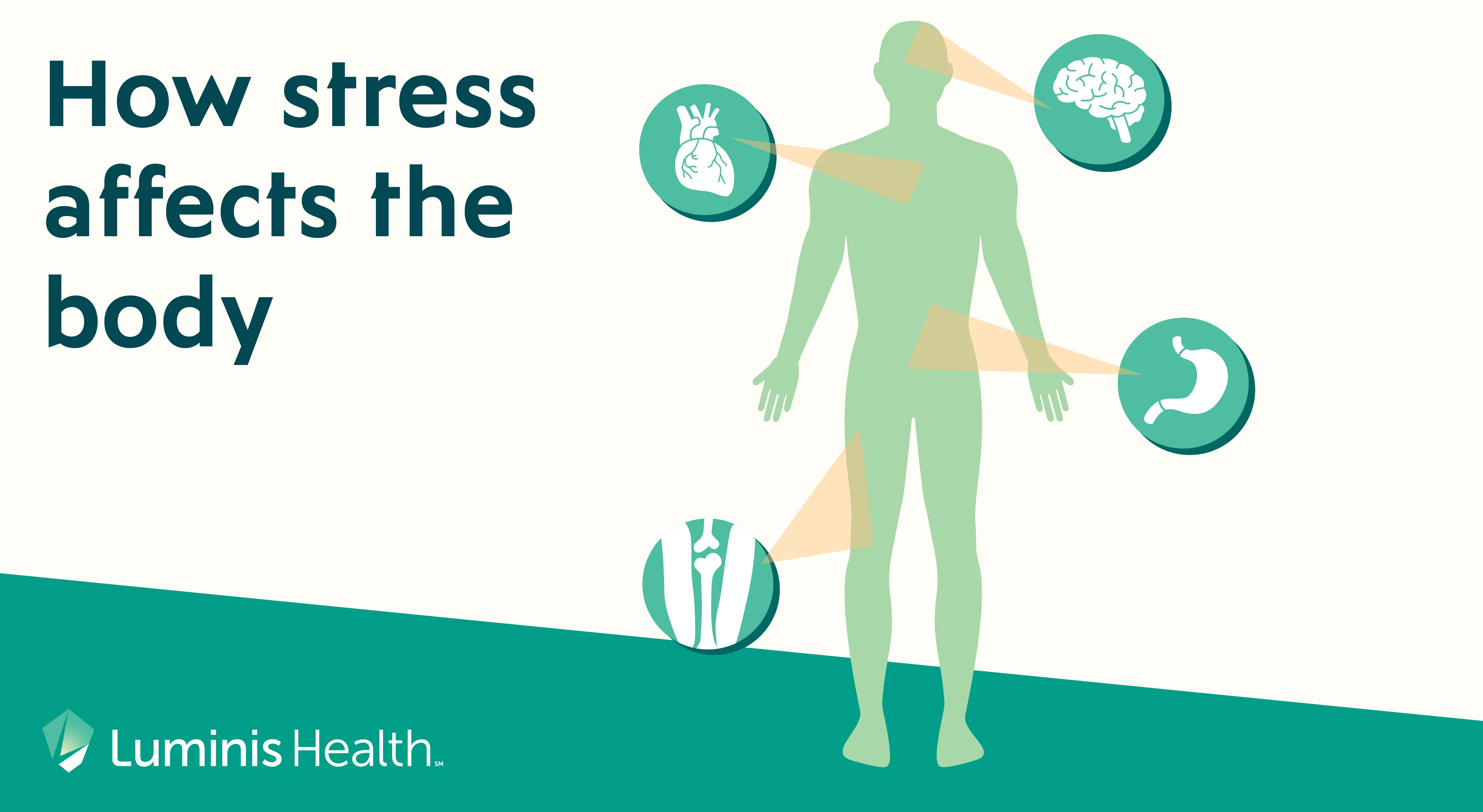Effective January 20, 2026, masks are encouraged for all staff, patients and visitors at all Luminis Health locations and will remain encouraged through the end of the influenza season. Thank you for your patience as we continue to care for our community.

Should you stress about stress?
Stress is part of life, but its impact on your health can be more serious than you might think. While eliminating stress entirely may not be realistic, managing it effectively could be life-saving. It’s important to understand how stress affects your body—and what you can do to take control.
Stress and your body’s systems
Your body is equipped to handle stress in small doses. But heavy stress—especially over long periods of time—can take a toll on every aspect of your health, from your mental and emotional wellbeing to your physical condition. And physiologically speaking, stress can affect every one of your body’s systems in one way or another.
Stress and your heart health
When you become stressed, your heart rate increases and your heart muscle contracts—which means your blood vessels pump more blood to different parts of your body, temporarily raising your blood pressure. When your heart rate is consistently higher, and stress hormones increase your blood pressure on a regular basis, it can significantly multiply your risk for a heart attack or stroke.
Stress and your gastrointestinal (GI) tract
The neurons in your gut constantly communicate with your brain. Stress can affect this communication and trigger bloating, pain and other discomfort. And high levels of stress over time can often lead to chronic GI conditions, like irritable bowel syndrome (IBS).
Stress and your musculoskeletal system
When your body becomes stressed, your muscles tense up. Chronic (constant) stress causes your muscles to be in a continuous state of guardedness, which can cause stress-related disorders. For example, chronic muscle tension in your shoulders can lead to migraines and tension headaches. For many people who have chronic pain conditions related to musculoskeletal disorders though, stress-relieving activities can bring significant relief.
Stress and your respiratory system
Stress can manifest itself as shortness of breath and rapid breathing. While this isn’t typically a problem for people without respiratory disease, it can harm those who have conditions such as asthma and chronic obstructive pulmonary disease (COPD). In fact, some studies suggest that high amounts of stress can trigger asthma attacks.
Stress and your nervous system
Stress triggers your body’s “fight or flight” response, which signals your adrenal glands to release hormones. When the crisis is over, your body usually returns to its normal state. But chronic stress can cause a long-term drain on your body.
Stress and your reproductive system
For men, chronic stress can affect testosterone production, leading to a decreased sex drive and sometimes causing erectile dysfunction. It can also reduce sperm production. For women, stress can cause missing or delayed periods, which in turn affects their ability to conceive. In addition, it can make premenstrual syndrome (PMS) much worse.
Managing your stress
Stress management can be challenging, but it’s a necessity. The good news is that making small, incremental changes can pack a big punch. Consider trying these strategies:
- Aim for seven to nine hours of sleep each night. Sleep has remarkable restorative power, and you’re more likely to be able to manage stress when you’re well-rested.
- Connect with others. Spending time with family and friends can be a pleasant distraction from life’s struggles. Loved ones can lend a listening ear and laughter is always good medicine.
- Eat a well-balanced diet. A healthy diet that’s heavy on fruits, vegetables and whole grains will go a long way toward helping you feel your best. Food is fuel for the mind and body.
- Exercise regularly. Physical activity releases endorphins, which are your body’s natural feel-good chemicals. Aim for 30-minutes of exercise a day at a minimum.
- Try proven relaxation techniques. Whether it’s yoga, meditation, music, art or journaling, relaxation techniques can help your mind—and body—find much-needed balance.
- Meet with a therapist. A therapist, counselor or other professional can help you understand the root of your stress and come up with long-term plans for stress relief.
Support when you need it
A Luminis Health Behavioral Health provider can help you figure out the cause of your stress and offer additional ways to manage it. If stress is disrupting your life or putting your health at risk, make an appointment with someone from our team today.
 Crystal Osuchukwu, LCPC, is a licensed clinical professional counselor. To make an appointment with Crystal, please call 301-623-4352.
Crystal Osuchukwu, LCPC, is a licensed clinical professional counselor. To make an appointment with Crystal, please call 301-623-4352.



